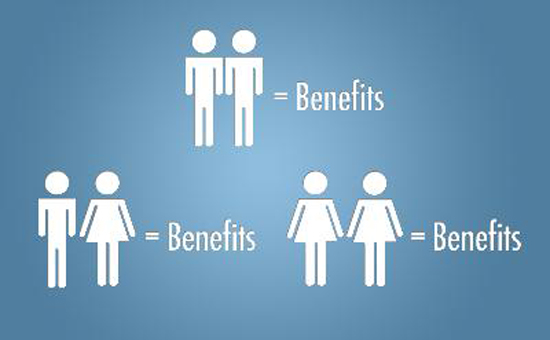 By Christina Sampson | Casa Grande Dispatch
By Christina Sampson | Casa Grande Dispatch
(Edited for length by Rose Law Group Reporter)
When Central Arizona College added employees’ domestic partners — regardless of gender — to its list of eligible benefit recipients in March 2012, it did so quietly, without any fuss.
Tom Di Camillo, CAC’s spokesman, said the change was suggested by “different employee groups” who spoke with the school’s benefits and salary committee.
The college’s human resources department doesn’t track how many employees enrolled their domestic partners, but Di Camillo said “some are taking advantage of it.”
“Anytime you provide good benefits, on its own it stands as a recruitment tool,” Di Camillo said.
Proving a domestic partner’s eligibility at CAC is a bureaucratic yet straightforward process. The employee and partner must provide an affidavit of domestic partnership, live together, prove they are jointly responsible for basic living expenses and not be married to anyone else.
But despite the perfunctory passage, the benefits make the college a veritable island within the public sphere of Pinal County, where domestic partners are not eligible for employee benefits by the county or any of the cities within it.
In Casa Grande, neither the high school district nor the elementary school district offers benefits to domestic partners of employees Statewide, only Pima County and the cities of Tucson, Phoenix, Scottsdale and Tempe offer such benefits.
Casa Grande Regional Medical Center has offered gender-neutral domestic partner benefits since 2005. The requirements to prove eligibility are nearly identical to CAC’s.
“The one requirement for everyone is that they have durable power of attorney for each other, other,” said Kelly Rosburg, hospital benefits and compensation specialist.
Of the state’s top 20 employers, 13 offer domestic partner benefits, including Honeywell, Raytheon, Banner Health Systems, Walgreens and Home Depot.
Ruling could change offerings
Arizona offers state and university employees same-sex domestic partner benefits, but only because a U.S. District Court preliminary injunction prohibits the state from enacting a 2009 law excluding them.
The state law was intended to disqualify all domestic partners, regardless of gender, from receiving employee benefits.
Arizona’s 2013 active and retired employee guide, which outlines employee benefits and eligibility, makes it clear the state intends to enact the law disqualifying all domestic partners if the injunction is lifted.
A disclaimer warns that the state “reserves the right to immediately discontinue offering benefits to same-sex domestic partners during the 2013 plan year and thereafter.”
The termination of benefits would also extend to dependent children of the domestic par ner.
In 2008, then-Gov. Janet Napolitano had the Department of Administration redefine who qualified as a “dependent.”
Under the new definition, dependents included anyone, regardless of gender, with whom a state or university employee had lived for a year and intended to continue living with. Domestic partners had to provide an affidavit proclaiming domestic partnership and prove financial interdependence with the employee.
When Napolitano resigned as governor in 2009 to become secretary of homeland security, Gov. Jan Brewer and the Republican-controlled Arizona Legislature enacted a law revoking the benefits.
Arizona Attorney General Tom Horne and Brewer both pointed to the state’s $1.6-billion deficit as a driving factor in the law’s passage, saying the state spent $5.5 million on same- sex partner benefits in the first year the law was in effect.
Under the law, coverage for heterosexual employees’ domestic partners expired in 2009, but the Lambda Legal Defense and Education Fund quickly filed a lawsuit on behalf of gay state employees.
The U.S. 9th Circuit Court of Appeals ruled against the state aw in 2011, despite Horne’s arguments that the law supports the state’s interest in promoting marriage.
The state asked the U.S. Supreme Court to hear the case, but the high court chose not to hear arguments or issue a decision.
That leaves the door open for a future order. Arizona’s marriage law could be affected by a ruling in United States v. Windsor, which challenges the federal government’s definition of marriage as only between a man and a woman in the Defense of Marriage Act on the grounds it violates the Constitution’s equal protection clause.
Another case, Hollingsworth v. Perry, could also affect Arizona marriage laws. The case challenges Proposition 8, California’s voter-approved law that changed the state constitution to only permit marriage between a man and a women.
If the Supreme Court rules broadly in both cases, it could potentially overturn Arizona’s own ban on same-sex marriages.
Rulings in both cases are expected by June 30.
If you’d like to discuss employment or health care law, contact David Weissman, director of the Rose Law Group Employment Law and Managed Health Care Law Practice, dweissman@roselawgroup.com











